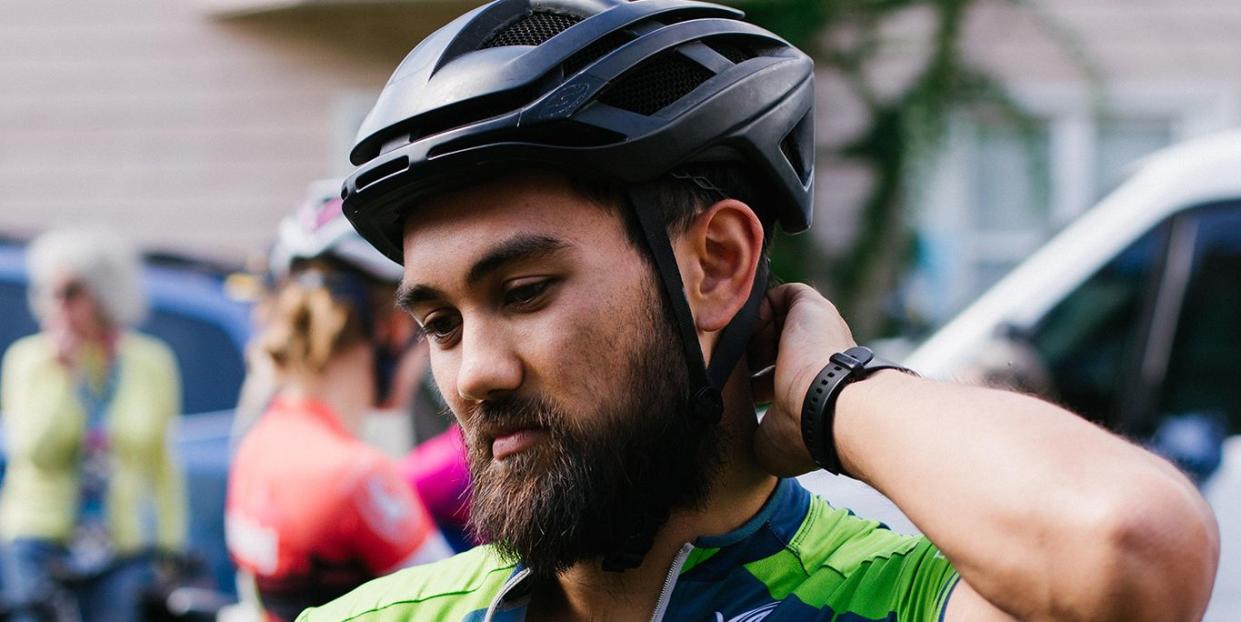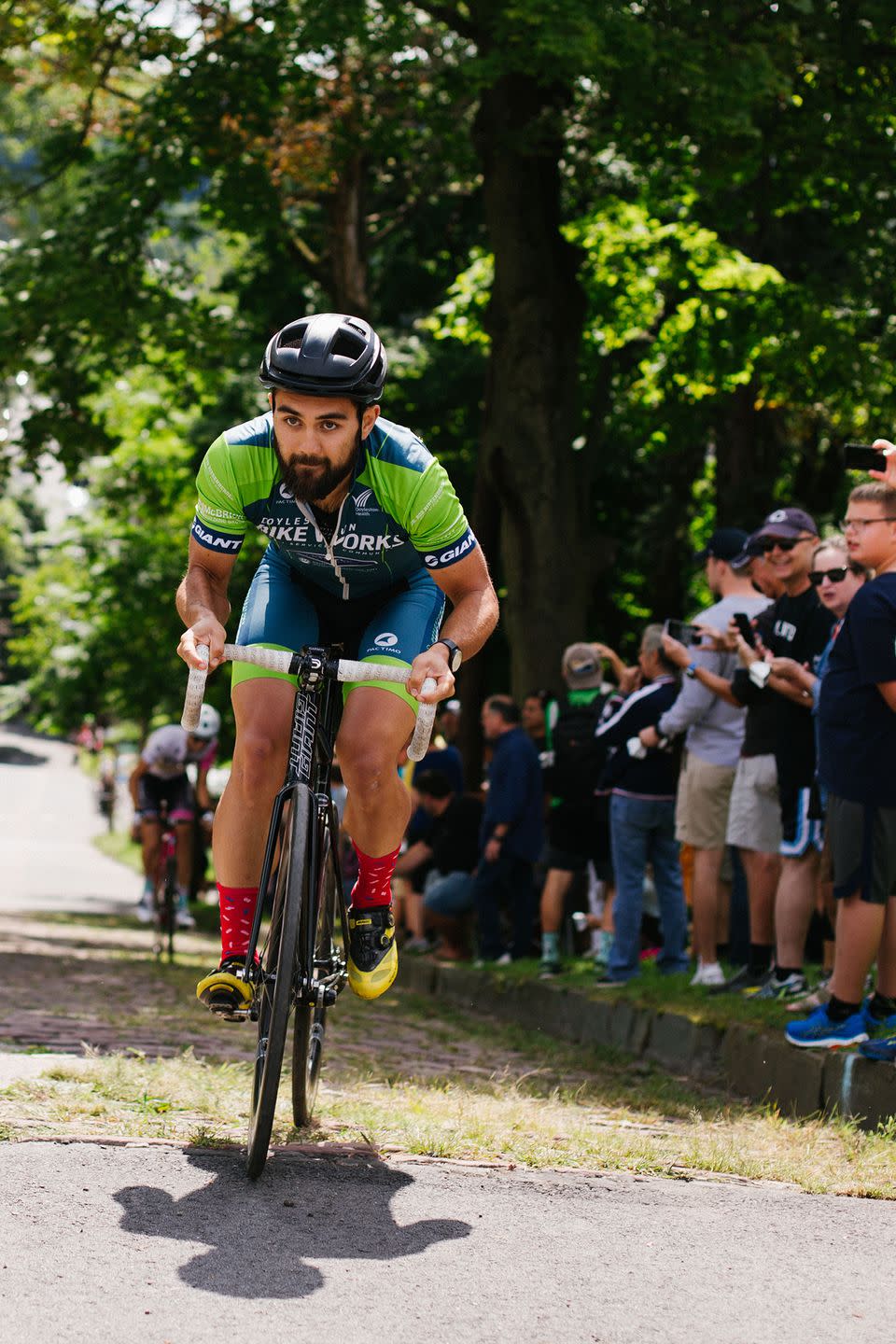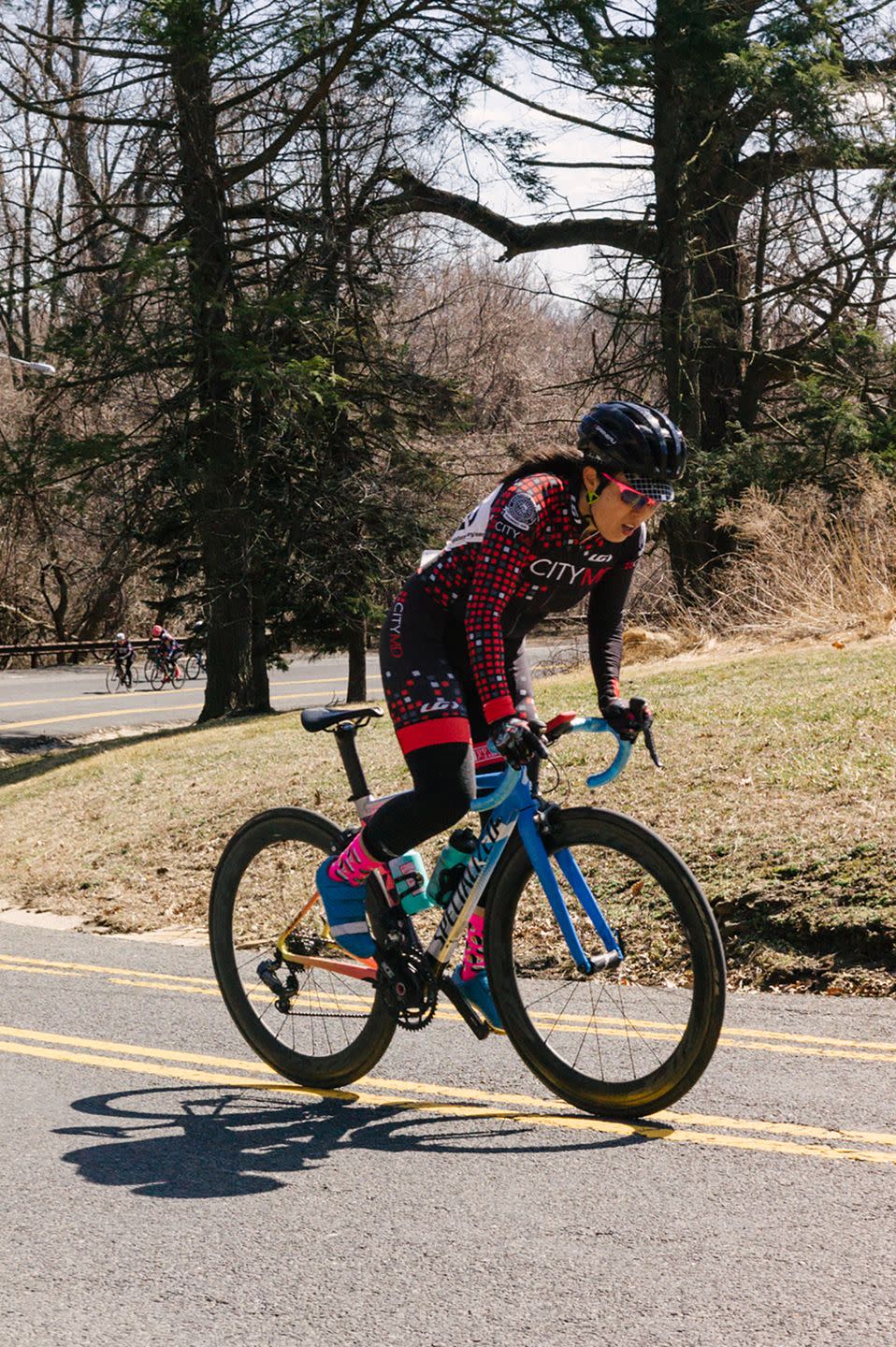Four Cyclists Share What Anti-Asian Racism Looks Like in the Bike World

Over the past year, Asian Americans across the country have been facing increased discrimination, thanks in large part to the hateful and racist language encouraged by the Trump administration around the coronavirus pandemic.
And cyclists have not been exempt as targets of racism. We asked Asian American and Pacific Islander (AAPI) cyclists about their feelings on racism within cycling, how the bike world needs to change, and what all cyclists can do to help.

“I never had an AAPI cycling role model.”
Andy Dudle, 30, lives in eastern Pennsylvania’s Lehigh Valley with his wife and two rescue dogs. He races at an elite level in road, mountain bike, cyclocross, and track; he’s also the unofficial fixed-gear hill climb champion of Pennsylvania.
I’ve loved bikes for almost as long as I can remember. I was lucky to have a cyclist as a dad. He basically funded my cycling interest throughout high school—I have no idea how I would have been able to do it otherwise. One thing I never had, though, was an AAPI cycling role model. Even today, it’s hard to think of any. It’s common for there to be a bit of ambiguity with AAPI people. Unless they go ahead and advertise it, people don’t have a way of knowing for sure.
That’s probably one the biggest things I’ve taken away from the past few years. By no means am I saying that I should be a role model for all the AAPI youngsters out there, but it may be reassuring for them to see someone who looks like them competing at a somewhat high level.
I see diversity as a no-brainer. The more diversity people see in cycling, the more the sport will draw diversity. If it’s mostly white people competing in cycling, we’re missing out on huge talent pools. There’s nothing about being born in Belgium that makes a person great at cyclocross, or any reason why being Swiss makes someone a great mountain biker. These are much smaller countries than the United States. I’m willing to bet that they’ve created an infrastructure to make cycling more accessible. In the United States, public schools help make it easy for kids to try team sports like football and basketball, sports that Americans coincidentally do well in.
I do want to say that I’ve been lucky to have never come across any form of inherent prejudice toward me in the cycling world. I have done a lot of racing, though, and the elitism is rampant. It’s very easy to see how an outsider looking in, especially a BIPOC outsider, would be intimidated. From what I’ve seen, community programs and mentorships have been great ways to get outsiders more interested in cycling.

“Phrases like ‘China carbon’ or ‘kung fu frame’ carry weight.”
Ryan Wei, 34, is a Sonoma County-based elite amateur road racer with Team CLIF Bar Cycling. When he’s off the bike, he’s completing his residency in family medicine.
The recent violence against AAPI individuals has sadly validated the feelings of “otherness” that I have buried, turned my head away from, and ignored in the past—which in itself is a contributor to the problem, and I own that. I used to think that those kinds of things could only happen in a place where not a lot of Asian folks live. That belief has proved to be completely incorrect. My grandmother lives in Chinatown in downtown Los Angeles, which seems like the safest place for her, but I worry about her safety. I would not be surprised if many other Asian Americans have had similar fears. For myself recently, thoughts of safety certainly cross my mind when I’m alone with a person or group of non-Asian people I don’t know. It is so unfortunate that the violence has had such wide repercussions.
In the bike world, I think we have our heads turned toward the direction of inclusion, which is the right start. From the AAPI viewpoint, my feeling is that many of us are still held in the problematic “model minority” sentiment—allowed, tolerated, and expendable at any time. I don’t think it’s any one person’s fault; it is unfortunately spilled over from a history of years of Asian American othering in the U.S. To be more welcoming to AAPI individuals is not about using politically correct jargon or going above and beyond to be friendly. Instead, we should question our current values toward AAPI individuals in America and where those values came from. Often used innocently, phrases like “China carbon” or “kung fu frame” carry weight, whether the speaker intended them to or not. The bike world and the AAPI community should coexist in a safe space for discussion and revision.
Diversity should not be conditional. Rather, it should be about doing the right thing—which in our human hearts should be accepting others for who they are. Riding bikes is like being American; all of us are so fortunate to be participants, and we were all beginners once. When we do include everyone, we have the opportunity to create something that is uniquely American for bike racing.

“People mistake me for ‘some other Asian person’ who looks nothing like me.”
Lucia Deng, 41, is a health care technology lawyer in New York City. She is also a Bronx safe streets advocate with Transportation Alternatives and board member of USA Cycling. She races road, cyclocross, and mountain bikes with CRCA/ToBeDetermined.
I happen to be a thin, cis, hetero, non-disabled East Asian woman with comfortable employment. I don’t speak with any foreign accent. I can’t think of any overt racism I’ve experienced within the cycling community, but my experience is night and day from, say, a typical New York City food delivery worker, nail salon worker, or someone collecting bottles from the trash. And that matters a great deal in terms of how people treat me.
But when it comes to less overt racism or cases of microaggression, that’s a different story. I think we’ve all experienced it in one form or another, both on and off the bike. It happens at work, when coworkers ask me for recipes for Chinese food, for example. Or someone will say I’m “so quiet,” when anyone who knows me would tell you I’m most certainly not meek or quiet! Within cycling, the clearest example I can give is when people (usually white) mistake me for “some other Asian person” who looks nothing like me in face or body type. This happens most often, almost regularly, when I go mountain biking—a discipline that in my region is the least diverse of all the cycling disciplines. It always happens to me when I travel out of state to ride. I get that people don’t mean any harm, and they typically sound embarrassed and apologize when they realize their mistake. But folks need to stop acting so surprised when they see someone out on the trail who doesn’t look like them.
I think the cycling industry is slowly starting to get better about including more representation in its images and stories. Anecdotally, though, it feels like while brands are quicker to include an Asian-presenting face (typically East Asian), we see very few stories on Asian cyclists. It makes me wonder if those cyclists even out there outside of the East Coast and West Coast bubbles. In the cycling industry, there’s definitely less attention paid in general to harm against AAPI folks. You see very few brands call out anti-Asian violence. And even among my friends and teammates, very few people have reached out to acknowledge or check in on how I’m feeling. Mostly, it’s been my Asian friends checking in on one another. So while I wouldn’t say folks don’t care—because I think they do and would come to my aid if any physical harm were to happen to me—it more feels like people don’t know how to talk about this. It just hasn’t been talked about as much or for as long as, say, the Black Lives Matter movement has. (To be clear, I do not mean to compare the prevalence of AAPI hate to anti-Black hate. They’re both very different, and it’s horrible that either exists).

“Name-calling, bullying, and harassment have been so common for me that I often forget that it’s not acceptable behavior.”
Allen Lim, PhD, 48. Parts from China. Made in the Philippines. Programmed in Los Angeles. Currently residing in Boulder, CO, Lim is a former sports scientist with the TIAA-CREF, Garmin, and RadioShack pro cycling teams. He is also coauthor (with Biju Thomas) of the Feed Zone cookbook series, science advisor for LUX Cycling, and founder of Skratch Labs.
It’s been my personal experience that both the implicit and explicit bias against Asian Americans has always existed in both America and Europe. As a Chinese immigrant to America and someone who spent almost a decade based in Europe on the pro cycling tour, this bias—in the form of name-calling, bullying, and harassment—has been so common for me that I often forget that it’s not acceptable behavior. Like most Asian Americans, I’ve just learned to ignore it, duck for cover, and play the model citizen. What happened in Atlanta, and the boiling over of hate during the pandemic, causes me a lot of distress and needs to stop. In fact, just before the Atlanta shootings [on March 16, 2021], I was harassed in my local supermarket in Boulder, with a very hostile and repeated “Hey, where are you from?” While I don’t have any good solutions on how to make this ignorant hate stop, I do know that in my own community of Asian Americans we are no longer tolerant of hiding from this issue. I see a surge in political activism in the Asian American community that gives me hope. That said, and speaking for myself, I’m really, really angry right now. I’m also overwhelmingly sad.
You Might Also Like

